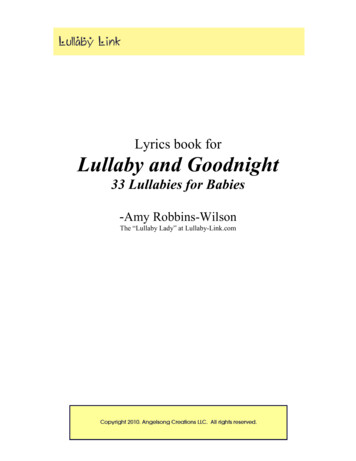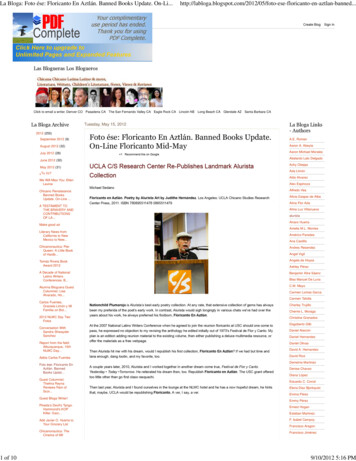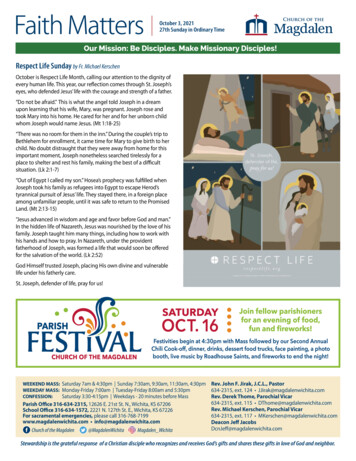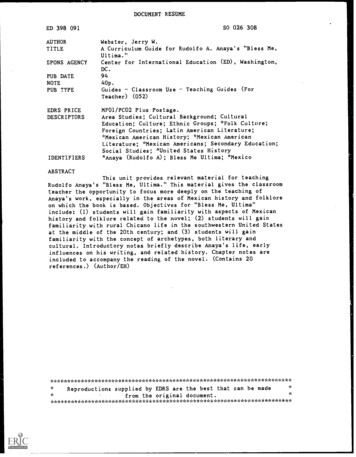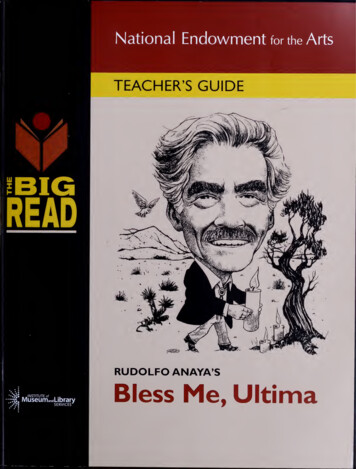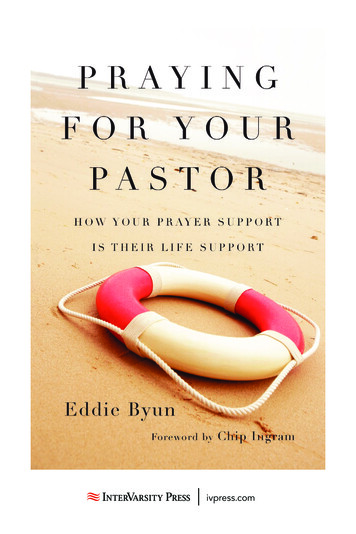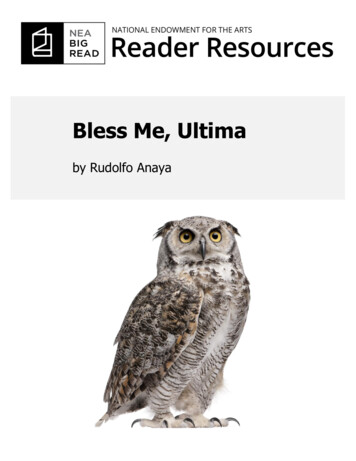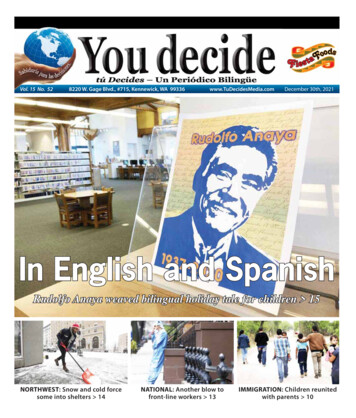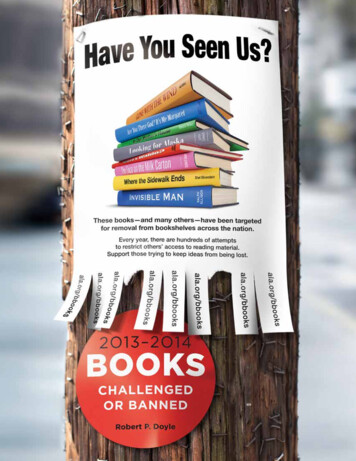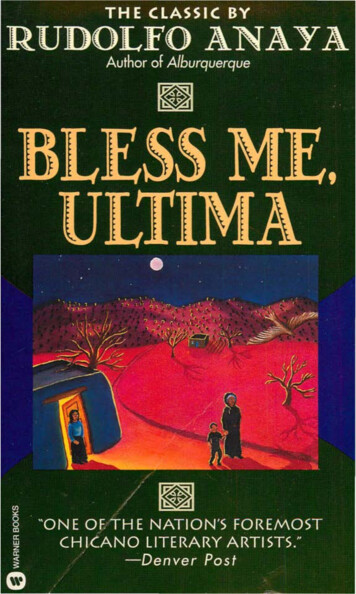
Transcription
60025ua.::::lffi
u L 'l'IMYL rro o 1e MiJ'" !l{Jll9 tJJJ1L9 tJJI 1"l L'l' f[':J{i POWi 9{ 0 J1l W:J{I WI9(tJJSWi i P J1l9{0V.9(tJJ '.Ml "Her eyes swept the surrounding bUls andthrough them I saw for the first ttme thewild beauty of our hills and the magtc ofthe green river. My nostrils quivered,as IfeU tbe song of the mockingbirds and tbedrone of tbe grasshoppers mingle with thepulse of the earth.The four directions ofthe llano met in me, and the white sunshoneonmy soul . . : -from BLESS ME, UI37MA000"This extraordinary storyteller has always writtenunpre tentiously but provocatively about identity. Everywork is a fiesta, a ceremony preservin g but reshapingold traditions that honor the power within the landand Ia raz-a, the people."-Los Angeles Times Booll Reviewmore .
000Anaya is in the vanguard of a movement to refashion"the Chicano identity by writing about il"-NIIIUmlll Clltbolle Reporler0"Quite extraordinary . . . intersperses the legendary,folkloric, stylized, or allegorized material with therealistic. . .--lllll 11 Amerlclln Llter11ry Review0"A nay a's first novel, BLESS ME, ULTIMA probablythe best-known and most-respected contempo rary Chicano fiction, probes into the fat satchelof remembered you th."-NewYoriTlmes0"A unique Americn novel that deserves to be betterknown."000
000"An unforgettable novel . already becoming a classicfor its uniqueness on story, narrative technique, andstructure."---Cbkilt10 Perspectives 111 LllerlltJire0"One of the best writers in this country."-El PIISO Times0"Remarkable . a unique American novel . a richand powerful synthesis for some of life's sharpestoppositions."0''When some of the 'new' ethnic voices become nation al treasures themselves, it will be in part because thegeneration of Solas, Anaya, Thomas, and Hinojosaserved as their compass."-Tbe Natltnl0 00
Books by Rudolfo AnayaBLESS ME, ULTIMABENDfCEME, ULTIMAALBURQUERQUETHE ANAYA READERZIA SUMMER)ALAMANTAATIENTION:SCHOOLS AND CORPORATIONSWARNER books are available at quantity dis counts with bulk purchase for educational,business, or sales promotional use. For infor mation, ple a s e wr ite to: SPEC IAL SALE SDEPARTME NT, WARN E RBOOKS, 1271AVENUE OFTHEAMERICAS, NEW YORK, N.Y.10020.
BLESS ME,ULTIMARUDOLFO ANAYAA Time Warner Company
This boo k was first published by TQS Publications, Berkeley, California.If you purchase this book without a cover you should be aware that thisbook may have been stolen property and reponed as "unsold anddestroyed" to the publisher. In such case neither the author nor lhe pub lisher has received any payment for this "stripped book."WARNER BOOKS EDITIONCopyright 1972 by Rudolfo A. AnayaAll rights reserved.Cover design by Diane LugerCover illustration by Bernadette VigilBook design by L. McReeThis Warner Books edition is published by ammgement with the author.Warner Books, Inc.1271 Avenue of the AmericasNew York, NY 10020VisitourWeb site atwww . wamerbooks.com A Time Warner CompanyPrinted in the United States of AmericaFirst Warner Books Paperback Printing: April 19942019IS1716
Con .Jlonorrpara .Jvfis rpadres
BLESS ME.ULTIMA
WnoQ/Itima came to stay with us the summer I was almostseven. When she came the beauty of the llano unfoldedbefore my eyes, and the gurgling waters of the river sang tothe hum of the turning earth. The magical time of childhoodstood still, and the pulse of the living earth pressed its mys tery into my living blood. She took my hand, and the silent,magic powers she possessed made beauty from the raw, sun baked llano, the green river valley, and the blue bowl whichwas the white sun's home. My bare feet felt the throbbingearth and my body trembled with excitement. Time stoodstill, and it shared with me all that had been, and all that wasto come.Let me begin at the beginning. I do not mean the begin ning that was in my dreams and the stories they whispered tome about my birth, and the people of my father and mother,and my three brothers-but the beginning that came withUltima.The attic of our home was partitioned into two smallrooms. My sisters, Deborah and Theresa, slept in one and Islept in the small cubicle by the door. The wooden stepscreaked down into a small hallway that led into the kitchen.From the top of the stairs I had a vantage point into the heartof our home, my mother's kitchen. From there I was to seethe terrified face of Chavez when he brought the terriblenews of the murder of the sheriff; I was to see the rebellion
2Rudolfo Anayaof my brothers against my father; and many times late atnight I was to see Ultima returning from the llano where shegathered the herbs that can be harvested only in the light ofthe full moon by the careful hands of a curandera.That night I lay very quietly in my bed, and I heard myfather and mother speak of Ultima."Esta sola," my father said, "ya no q ueda gente en e lpueblito d e Las Pasturas-"He spoke in Spanish, and the village he mentioned was hishome. My father had been a vaquero all his life, a calling asancient as the coming of the Spaniard to Nuevo Mejico.Even after the big rancheros and the tejanos came and fencedthe beautiful llano, he and those like him continued to workthere, I guess because only in that wide expanse of land andsky could they feel the freedom their spirits needed."Que lastima," my mother answered, and I knew her nim ble fingers worked the pattern on the doily she crocheted forthe big chair in the sala.I heard her sigh, and she must have shuddered too whenshe thought of U ltima living alone in the loneliness of thewide llano. My mother was not a woman of the llano, shewas the daughter of a farmer. She could not see beauty in thellano and she could not understand the coarse men who livedhalf their lifetimes on horseback. After I was born in LasPasturas she persuaded my father to leave the llano and bringher family to the town of Guadalupe where she said therewould be opportunity and school for us. The move loweredmy father in the esteem of his compadres, the other vaquerosof the llano who clung tenaciously to their way of life andfreedom. There was no room to keep animals in town so myfather had to sell his small herd, but he would not sell hishorse so he gave it to a good friend, Benito Campos. ButCampos could not keep the animal penned up because some how the horse was very close to the spirit of the man, and sothe horse was allowed to roam free and no vaquero on thatllano would throw a lazo on that horse. It was as if someonehad died, and they turned their gaze from the spirit thatwalked the earth.
Bless Me, Ultima3It hurt my father's pride. He saw less and less of his oldc o m p ad res. He went to work on t h e highway and o nSaturdays after they collected their pay h e drank with hiscrew at the Longhorn, but he was never close to the men ofthe town. Some weekends the llaneros would come into townfor supplies and old amigos like Bonney or Campos or theGonzales brothers would come by to visit. Then my father'seyes lit up as they drank and talked of the old days and toldthe old stories. But when the western sun touched the cloudswith orange and gold the vaqueros got in their trucks andheaded home, and my father was left to drink alone in thelong night. Sunday morning he would get up very crudo andcomplain about having to go to early mass."-She served the people all her life, and now the peopleare scattered, driven like twnbleweeds by the winds of war.The war sucks everything dry," my father said solemnly, "ittakes the young boys overseas, and their families move toCalifornia where there is work-""Ave Maria Purisima," my mother made the sign of thec r o s s for my three br others who w e r e away at w a r ."Gabriel," she said to m y father, " i t i s n o t right that IaGrande be alone in her old age-""No," my father agreed."When I married you and went to the llano to live withyou and raise your family, I could not have survived withoutIa Grande's help. Oh, those were hard years-""Those were good years," my father countered. But mymother would not argue."There isn't a family she did not help," she continued, "noroad was too long for her to walk to its end to snatch some body from the jaws of death, and not even the blizzards ofthe llano could keep her from the appointed place where ababy was to be delivered-""Es verdad," my father nodded."She tended me at the birth of my sons-" And then Iknew her eyes glanced briefly at my father. "Gabriel, wecannot let her live her last days in loneliness-""No," my father agreed, "it is not the way of our people."
Rudolfo Anaya4" I t would be a great honor to provide a home for l aGrande," m y mother murmured. M y mother called Ultima l aGrande out of respect. I t meant the woman was old and wise."I have already sent word with Campos that Ultima is tocome and live with us," my father said with some satisfac tion. He knew it would please my mother."I am grateful," my mother said tenderly, "perhaps we canrepay a l i ttle of the kindness Ia Grande has given to somany.""And the children?" my father asked. I knew why heexpressed concern for me and my sisters. It was becauseUltima was a curandera, a woman who knew the herbs andremedies of the ancients, a miracle-worker who could healthe sick. And I had heard that Ultima could l ift the curseslaid by brujas, that she could exorcise the evil the witchesplanted in people to make them sick. And because a curan dera had this power she was misunderstood and often sus pected of practicing witchcraft herself.I shuddered and my heart turned cold at the thought. Thecuentos of the people were full of the tales of evil done bybrujas."She helped bring them into the world, she cannot be butgood for the children," my mother answered."Esta bien," my father yawned, "I will go for her in themorning."So it was decided that Ultima should come and live withus. I knew that my father and mother did good by providinga home for Ultima. It was the custom to provide for the oldand the sick. There was always room in the safety andwarmth of Ia familia for one more person, be that pe rsonstranger or friend.It was warm in the attic, and as I lay quietly listening tothe sounds of the house falling asleep and repeating a HailMary over and over in my thoughts, I drifted into the time ofdreams. Once I had told my mother about my dreams, andshe said they were visions from God and she was happy,because her own dream was that I should grow up and
Bless Me, Ultima5become a priest. After that I did not tell her about mydreams, and they remained in me forever and ever . .In my dream I flew over the rolling hills of the llano. Mysoul wandered over the dark plain until it came to a clusterof adobe huts. I recognized the village of Las Pasturas andmy heart grew happy. One mud hut had a lighted window,and the vision of my dream swept me towards it to be witnessat the birth of a baby.I could not make out the face of the mother who restedfrom the pains of birth, but I could see the old woman inblack who tended the just-arrived, steaming baby. She nim bly tied a knot on the cord that had connected the baby to itsmother's blood. then quickly she bent and with her teeth shebit off the loose end. She wrapped the squirming baby andlaid it at the mother's side. then she returned to cleaning thebed. All linen was swept aside to be washed, but she care fully wrapped the useless cord and the afterbirth and laid thepackage at the feet of the Virgin on the small altar. I sensedthat these things were yet to be delivered to someone.Now the people who had waited patiently in the dark wereallowed to come in and speak to the mother and deliver theirgifts to the baby. I recognized my mother's brothers, myuncles from El Puerto de los Lunas. They entered ceremoni ously. A patient hope stirred in their dark, brooding eyes.This one will be a Luna, the old man said, he will be a·farmer and keep our customs and traditions. Perhaps Godwill bless our family and make the baby a priest.And to show their hope they rubbed the dark earth of theriver valley on the baby's forehead, and they surrounded thebed with the fruits of their harvest so the small room smelledof fresh green chile and corn , ripe apples and peaches,pumpkins and green beans.Then the silence was shattered with the thunder of hoof beats; vaqueros surrounded the small house with shouts andgunshots, and when they entered the room they were laugh ing and singing and drinking.Gabriel, they shouted, you have a fine son! He will make afine vaquero! And they smashed the fruits and vegetables
Rudo/fo Anaya6that surrounded the bed and replaced them with a saddle,horse blankets, bottles of whiskey, a new rope, bridles, cha pas, and an old guitar. And they rubbed the stain of earthfrom the baby's forehead because man was not to be tied tothe earth but free upon it.These were the people of my father, the vaqueros of thellano. They were an exuberant, restless people , wanderingacross the ocean of the plain.We must return to our valley, the old' man who led thefarmers spoke. We must take with us the blood that comesafter the birth. We will bury it in our fields to renew theirfertility and to assure that the baby will follow our ways. Henodded for the old woman to deliver the package at the altar.No! the 1/aneros protested, it will stay here! We will burnit and let the winds of the llano scatter the ashes.It is blasphemy to scatter a man's blood on unholyground, the farmers chanted. The new son must fulfill hismother's dream. He must come to El Puerto and rule overthe Lunas of the valley. The blood of the Lunas is strong inhim.He is a Marez, the vaqueros shouted. His forefathers wereconquistadores, men as restless as the seas they sailed andas free as the land they conquered. He is his father's blood!Curses and threats filled the air, pistols were drawn, andthe opposing sides made ready for battle. But the clash wasstopped by the old woman who delivered the baby.Cease! she cried, and the men were quiet. I pulled thisbaby into the light of life, so I will bury the afterbirth and thecord that once linked him to eternity. Only I will know hisdestiny.The dream began to dissolve. When I opened my eyes Iheard my father cranking the truck outside. I wanted to gowith him, I wanted to see Las Pasturas, I wanted to seeUltima. I dressed hurriedly, but I was too late. The truck wasbouncing down the goat path that led to the bridge and thehighway.I turned, as I always did, and looked down the slope of ourhill to the green of the river, and I raised my eyes and saw
Bless Me, Ultima7the town of Guadalupe. Towering above the housetops andthe trees of the town was the church tower. I made the signof the cross on my l ips. The only other building that roseabove the housetops to compete with the church tower wasthe yellow top of the schoolhouse. This fall I would be goingto school.My heart sank. When I thought of leaving my mother andgoing to school a wann, sick feeling came to my stomach.To get rid of it I ran to the pens we kept by the molino tofeed the animals. I had fed the rabbits that night and they willhad alfalfa and so I only changed their water. I scatteredsome grain for the hungry chickens and watched their madscramble as the rooster called them to peck. I milked the cowand turned her loose. During the day she would forage alongthe highway where the grass was thick and green, then shewould return at nightfall. She was a good cow and there werevery few times when I had to run and bring her back in theevening. Then I dreaded it, because she might wander intothe hills where the bats flew at dusk and there was only thesound of my heart beating as I ran and it made me sad andfrightened to be alone.I collected three eggs in the chicken house and returnedfor breakfast."Antonio," my mother smiled and took the eggs and milk,"come and eat your breakfast."I sat across the table from Deborah and Theresa and atemy atole and the hot tortilla with butter. I said very little. Iusually spoke very little to my two sisters. They were olderthan I and they were very close. They usually spent the entireday in the attic, playing dolls and giggling. I did not concernmyself with those things."Your father has gone to Las Pasturas," my mother chat tered, "he has gone to bring Ia Grande." Her hands werewh ite with the flour of the dough. I watched carefully."-And when he returns, I want you children to show yourmanners. You must not shame your father or your mother-""lsn 't her real name Ultima?" Deborah asked. She waslike that, always asking grown-up questions.
8Rudo/fo Anaya" You wi ll address her as Ia Grande," my mother saidflatly. I looked at her and wondered if this woman with theblack hair and laughing eyes was the woman who gave birthin my dream."Grande," Theresa repeated."Is it true she is a witch?" Deborah asked. Oh, she was infor it. I saw my mother whirl then pause and control herself."No!" she scolded. "You must not speak of such things!Oh, I don 't know where you learn such ways-" Her eyesflooded with tears. She always cried when she thought wewere learning the ways of my father, the ways of the Marez."She is a woman of learning," she went on and I knew shedidn't have time to stop and cry, "she has worked hard for allthe people of the village. Oh, I would never have survivedthose hard years if it had not been for her-so show herrespect. We are honored that she comes to live with us,understand?""Si, marna," Deborah said half willingly."Si, mama," Theresa repeated."Now run and sweep the room at the end of the hall.Eugene's room-" I heard her voice choke. She breathed aprayer and crossed her forehead. The flour left white stainson her, the four points of the cross. I knew it was because mythree brothers were at war that she was sad, and Eugene wasthe youngest."Marna." I wanted to speak to her. I wanted to know whothe old woman was who cut the baby's cord."Sf." She turned and looked at me."Was Ultima at my birth?" I asked."jAy Dios mfo!" my mother cried. She carne to where Isat and ran her hand through my hair. She smelled warm,like bread. "Where do you get such questions, my son. Yes,"she smiled, "la Grande was there to help me. She was thereto help at the birth of all of my children-""And my uncles from El Puerto were there?""Of course," she answered, "my brothers have alwaysbeen at my side when I needed them. They have alwaysprayed that I would bless them with a-"
Bless Me, Ultimo9I did not hear what she said because I was hearing thesounds of the dream, and I was seeing the dream again. Thewann cereal in my stomach made me feel sick."And my father's brother was there, the Marez' and theirfriends, the vaqueros-""Ay !" she cried out. "Don 't speak to me of those worth less Marez and their friends!"''There was a fight?" I asked."No," she said, "a silly argument. They wanted to start afight with my brothers-that is all they are good for. Va queros, they cal l themselves, they are worthless drunks!Thieves! Always on the move, like gypsies, always draggingtheir families around the country like vagabonds-"As long as I could remember she always raged about theMarez family and their friends. She called the village of LasPasturas beautiful; she had gotten used to the loneliness, butshe had never accepted its people. She was the daughter offanners.But the dream was true. It was as I had seen it. Ultimaknew."But you will not be like them." She caught her breath andstopped. She kissed my forehead. "You w i l l be like mybrothers. You will be a Luna, Antonio. You will be a man ofthe people, and perhaps a priest." She smiled.A priest, I thought, that was her dream. I was to hold masson Sundays like father Byrnes did in the church in town. Iwas to hear the confessions of the silent people of the valley,and I was to administer the holy Sacrament to them."Perhaps," I said."Yes," my mother smiled. She held me tenderly. The fra-grance of her body was sweet."But then," I whispered, "who will hear my confession?""What?""Nothing," I answered. I felt a cool sweat on my foreheadand I knew I had to run, I had to clear my mind of the dream."I am going to Jason's house," I said hurriedly and slid pastmy mother. I ran out the kitchen door, past the animal pens,
10Rudolfo Anayatowards Jas6n ' s house. The white sun and the fresh aircleansed me.On this side of the river there were only three houses. Theslope of the hill rose gradually into the hills of juniper andmesquite and cedar clumps. Jason's house was farther awayfrom the river than our house. On the path that led to thebridge lived huge, fat Ffo and his beautiful wife. Ffo and myfather worked together on the highway. They were gooddrinking friends." jJas6n !" I called at the kitchen door. I had run hard andwas panting. His mother appeared at the door."Jas6n no esta aquf," she said. All of the older peoplespoke only in Spanish, and I myself u nderstood onlySpan ish. It was only after one went to school that onelearned English."t,D6nde esra?" I asked.She pointed towards the river, northwest, past the railroadtracks to the dark hills. The river came through those hillsand there were old Indian grounds there, holy burial groundsJas6n told me. There in an old cave lived his Indian. At leasteverybody called him Jason's Indian. He was the only Indianof the town, and he talked only to Jas6n. Jas6n's father hadforbidden Jas6n to talk to the Indian, he had beaten him, hehad tried in every way to keep Jas6n from the Indian.But Jas6n persisted. Jas6n was not a bad boy, he was justJas6n. He was quiet and moody, and sometimes for no rea son at all wild, loud sounds came exploding from his throatand lungs. Sometimes I felt like Jas6n, like I wanted to shoutand cry, but I never did.I looked at his mother's eyes and I saw they were sad."Thank you," I said, and returned home. While I waited formy father to return with Ultima I worked in the garden.Every day I had to work in the garden. Every day I reclaimedfrom the rocky soil of the hill a few more feet of earth to cul tivate. The land of the llano was not good for farming, thegood land was along the river. But my mother wanted a gar den and I worked to make her happy. Already we had a fewchile and tomato plants growing. It was hard work. My fin-
Bless Me, Ultima11gers bled from scraping out the rocks and it seemed that asquare yard of ground produced a wheelbarrow full of rockswhich I had to push down to the retaining wall.The sun was white in the bright blue sky. The shade of theclouds would not come until the afternoon. The sweat wassticky on my brown body. I heard the truck and turned to seeit chugging up the dusty goat path. My father was returningwith Ultima."jMama!" I called. My mother came running out, Deborahand Theresa trailed after her."I'm afraid," I heard Theresa whimper."There's nothing to be afraid of," Deborah said confi dently. My mother said there was too much Marez blood inDeborah. Her eyes and hair were very dark, and she wasalways running. She had been to school two years and shespoke only English. She was teaching Theresa and half thetime I didn't understand what they were saying." Madre de Dios, but mind your manners! " my motherscolded. The truck stopped and she ran to greet Ultima."Buenos dfas le de Dios, Grande," my mother cried. Shesmiled and hugged and kissed the old woman."Ay, Maria Luna," Ultima smiled, "buenos dfas te deDios, a ti y a tu familia." She wrapped the black shawlaround her hair and shoulders. Her face was brown and verywrinkled. When she smiled her teeth were brown. I remem bered the dream."Come, come!'' my mother urged us forward. It was thecustom to greet the old. "Deborah ! " my mother urged.Deborah stepped forward and took Ultima's withered hand."B uenos dfas, Grande," she smiled. She even bowedslightly. Then she pulled Theresa forward and told her togreet la Grande. My mother beamed. Deborah 's good mannerssurprised her, but they made her happy, because a familywas judged by its manners."What beautiful daughters you have raised," Ultima nod ded to my mother. Nothing could have pleased my mothermore. She looked proudly at my father who stood leaningagainst the truck, watching and judging the introductions.
12Rudolfo Anaya"Antonio," he said simply. I stepped forward and tookUltima's hand. I looked up into her clear brown eyes andshivered. Her face was old and wrinkled, but her eyes wereclear and sparkling, like the eyes of a young child."Antonio," she smiled. She took my hand, and I felt thepower of a whirlwind sweep around me. Her eyes swept thesurrounding hills and through them I saw for the first timethe wild beauty of our hills and the magic of the green river.My nostrils quivered as I felt the song of the mockingbirdsand the drone of the grasshoppers mingle with the pulse ofthe earth. The four directions of the llano met in me, and thewhite sun shone on my soul. The granules of sand at my feetand the sun and sky above me seemed to dissolve into onestrange, complete being.A cry came to my throat, and I wanted to shout it and runin the beauty I had found."Antonio." I felt my mother prod me. Deborah giggledbecause she had made the right greeting, and I who was to bemy mother's hope and joy stood voiceless."Buenos dias le de Dios, Ultima," I muttered. I saw in hereyes my dream. I saw the old woman who had delivered mefrom my mother's womb. I knew she held the secret of mydestiny."jAntonio!" My mother was shocked I had used her nameinstead of calling her Grande. But Ultima held up her hand."Let it be," she smiled. "This was the last child I pulledfrom your womb, Maria. I knew there would be somethingbetween us."My mother who had started to mumble apologies wasquiet. "As you wish, Grande," she nodded."I have come to spend the last days of my life here,Antonio," Ultima said to me."You will never die, Ultima," I answered. "I will take careof you-" She let go of my hand and laughed. Then m yfather said, "Pase, Grande, pase. Nuestra casa e s s u casa. I t istoo hot to stand and visit in the sun-""Si, sf," my mother urged. I watched them go in. Myfather carried on his shoulders the large blue-tin trunk which
Bless Me, Ultima13later I learned contained all of Ultima's earthly possessions,the black dresses and shawls she wore, and the magic of hersweet smelling herbs.As Ultima walked past me I smelled for the first time atrace of the sweet fragrance of herbs that always lingered inher wake. Many years later, long after Ultima was gone and Ihad grown to be a man, I would awaken sometimes at nightand think I caught a scent of her fragrance in the cool-nightbreeze.And with Ultima came the owl. I heard it that night for thefirst time in the juniper tree outside of Ultima's window. Iknew it was her owl because the other owls of the llano didnot come that near the house. At first it disturbed me, andDeborah and Theresa too. I heard them whispering throughthe partition. I heard Deborah reassuring Theresa that shewould take care of her, and then she took Theresa in herarms and rocked her until they were both asleep.I waited. I was sure my father would get up and shoot theowl with the old rifle he kept on the kitchen wall. But hedido't, and I accepted his understanding. In many cuentos Ihad heard the owl was one of the disguises a bruja took, andso it struck a chord of fear in the heart to hear them hootingat night. But not Ultima's owl. Its soft hooting was like asong, and as it grew rhythmic it calmed the moonlit hills andlulled us to sleep. Its song seemed to say that it had come towatch over us.I dreamed about the owl that night, and my dream wasgood. La Virgen de Guadalupe was the patron saint of ourtown. The town was named after her. In my dream I sawUltima's owl lift Ia Virgen on her wide wings and fly her toheaven. Then the owl returned and gathered up all the babesof Limbo and flew them up to the clouds of heaven.The Virgin smiled at the goodness of the owl.
Wltima slipped easily into· the routine of our daily life.The first day she put on her apron and helped my motherwith breakfast, later she swept the house and then helped mymother wash our clothes in the old washing machine theypulled outside where it was cooler under the shade of theyoung elm trees. It was as if she had always been here. Mymother was very happy because now she had someone totalk to and she didn't have to wait until Sunday when herwomen friends from the town came up the dusty path to sitin the sala and visit.Deborah and Theresa were happy because Ultima didmany of the household chores they normally did, and theyhad more time to spend in the attic and cut out an inter minable train of paper dolls which they dressed, gave namesto, and most miraculously, made talk.My father was also pleased. Now he had one more personto tell his dream to. My father's dream was to gather his sonsaround him and move westward to the land of the settingsun, to the vineyards of California. But the war had taken histhree sons and it had made him bitter. He often got drunk onSaturday afternoons and then he would rave against old age.He would rage against the town on the opposite side of theriver which drained a man of his freedom, and he would crybecause the war had ruined his dream. It was very sad to see
Bless Me, Ultima15my father cry, but I understood it, because sometimes a manhas to cry. Even if he is a man.And I was happy with Ultima. We walked together in thellano and along the river banks to gather herbs and roots forher medicines. She taught me the names of plants and flow ers, of trees and bushes, of birds and animals; but mostimportant. I learned from her that there was a beauty in thetime of day and in the time of night, and that there was peacein the river and in the hills. She taught me to listen to themystery of the groaning earth and to feel complete in the ful fillment of its time. My soul grew under her careful guid ance.I had been afraid of the awful presence of the river,
000 "Anaya is in the vanguard of a movement to refashion the Chicano identity by writing about il" -NIIIUmlll Clltbolle Reporler 0 "Quite extraordinary . . . intersperses the legendary, folkloric, stylized, or allegorized material with the .
